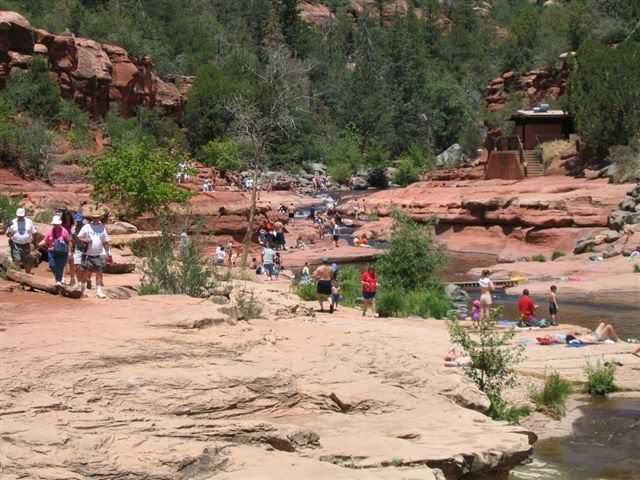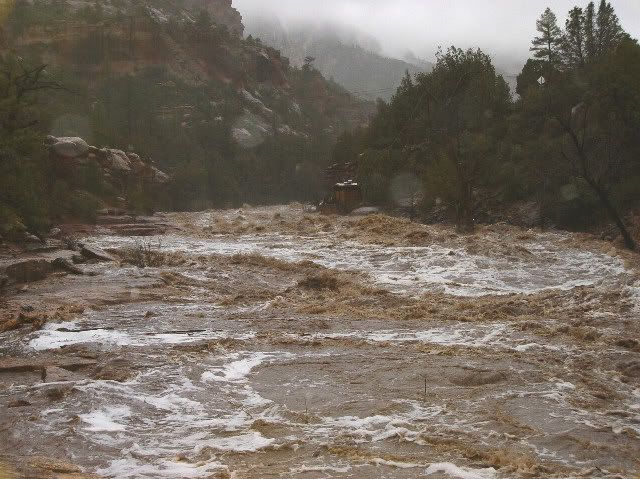Yesterday, Flagstaff, AZ became the latest community to vote on limits to "big box" stores. When Wal-mart wanted to create a larger store that offered groceries, a group of local citizens didn't like the idea. Not satisfied with exercising their individual right not to shop there, they got their city government to craft an ordinance to stop Wal-mart from expanding. Wal-mart supporters gathered signatures and forced the ordinance to clear the voters as Proposition 100. Via Arizona Watch, the ordinance would:
- Prevent retail establishments larger than 125,000 square feet
- Require retail establishments larger than 75,000 square feet to restrict the
sale of non-taxable grocery items to less than 8% of their floor space
- Require retail establishments larger than 75,000 square feet to be subject
to economic impact studies
- Require a conditional use permit (and the associated community input and
hearings) for establishments larger than 75,000 square feet
Like all zoning, the ordinance was an attempt of citizens to control the use of someone else's property without having to actually buy the property. Fortunately, the measure failed, though narrowly. I will say that to some extent, I have trouble defending Wal-mart. Wal-mart often takes advantage of statist actions to grow, including accepting loads of local government incentives and even eminent domain to grow. To some extent, getting nailed by a local government is just getting hoist on its own petard, but I will defend them anyway because I could be next.
Supporters of the ban rallied under the "new urbanism" concept:
Meanwhile, the New
Urbanism concept -- a community design that mixes residential and
businesses districts to decrease the need to drive to outlying areas --
may face some challenges.
"What this
means is we're going to have to make some alternatives to the New
Urbanism vision," said Councilmember Kara Kelty. "We understand that we
have to maximize land usage. We need to continue that effort, but we
can't do that without the public."
Basically New Urbanism supporters would rather have a bunch of expensive and limited choice (but cute!) boutiques for you to shop at rather than whatever store you would prefer to shop at. Rather than leaving this decision up to consumers, we-know-better-than-you planners in government take this upon themselves. Reason had a nice article on New Urbanism. Cato critiqued the smart growth folks here.
But, don't be fooled that this is just about land use. This reaction article from the Arizona Daily Sun has some priceless quotes (note that these are from people the reporter found shopping in Wal-mart!):
"I voted 'Yes.' I'm really
disappointed because this town has enough Wal-Marts, and I don't know
where they're going to find land space for huge stores, with that kind
of square feet. We're running out of room for people to live here. I
wonder how happy they'll be if the Super Wal-Mart was built on McMillan
Mesa, that's private land. I don't know where they're going to put one."
First, if they can't find the land, then there won't be a problem, will there? And god forbid someone builds a Wal-mart on private land. Should we use eminent domain instead? I must admit that to some extent I sympathize with the residents of Flagstaff. Like Boulder or Vail, it is a small town in a beautiful mountain setting. And, like Boulder and Vail, the wealthy of nearby large cities (Phoenix) have descended on it, buying second homes like crazy. The result has been increased traffic and prices, offset by a white-hot economy, increases in wealth for long-time residents via existing home prices, and huge boost to the tax base that is much larger than the cost of serving the new part-year residents. The locals are trying to figure out how to keep the capital gains in their homes, keep the extra jobs, and keep the extra taxes without actually having any new people in town, and its not really working for them.
"My first reaction was
'Boo' when they announced it. They announced it over the loudspeaker. I
heard some cheers, and I heard some claps. The one thing I hate is the
thought of creating minimum-wage, part-time jobs that do not pay their
employees' benefits. They're just going to exploit more college
students, like they do here. I do shop here for lack of a better place
to shop."
Whoa, this doesn't sound much like land use, but it sure is heard as a rationale a lot for anti-Walmart zoning. Look, if Wal-mart is paying too little, then no one will take the jobs. Since these are net new jobs, they likely will go to people not now currently working. How does that hurt anyone? By the way, you gotta love the "exploit more college students" swipe. Since when are college students owed more than minimum wage? I worked for minimum wage in college, and I seem to be OK. Also, how can many college students want anything other than part-time work? And, most hilariously, I don't know any [mostly young, healthy] college student that gives a rip about benefits (by which I presume they mean medical). Very few college students have or need health coverage separate from their parents or school programs anyway. I wrote a lot more about Wal-mart and wages here.
By the way, this man's commitment to principals is hilarious. When quoted, he was shopping at Wal-mart. This person can't even be bothered with the one strong individual free-will non-coercion option open to him: Don't shop there. When quoted, he was at that very moment benefiting in the form of lower prices for whatever was in his cart from these supposedly horrible labor practices. Jeez, talk about knee-jerk statism. If half of the shoppers in that store voted for this limit Wal-mart ordinance, then get them together and boycott the damn place and you'll probably shut it down, and you could leave the government and property rights violations out of it.
Now, let us all get out our violins for this guy who voted for the limits:
"I feel like a hypocrite
because I do shop at Wal-Mart. If we let them build a Super Wal-Mart,
what happens to this current store? Are we going to have a big empty
space there? If they move it to the other side of town, I won't go over
there. This is convenient for me.
OK, so this man voted to use government force and coercion to wipe out the property rights of other private individuals because... he was afraid new stores might be less convenient? Look folks, this is why we have a Constitution and Bill of Rights, and why the founders did not create an unlimited democracy. 51% of the people are not supposed to vote away the rights of the other 49%. We protect rights like speech against such tyranny of the majority. At some point, unfortunately, we stopped protecting property rights. This is the result - your property rights effectively subsumed to people who are worried about driving too far to the store.
I will end on this one:
"I think it stinks. I
voted 'Yes' for the proposition. I definitely didn't like the tactics
(Wal-Mart) used. I wish people didn't go and shop there. I really
thought it was going to get beat. We voted down fluoride, so why not
vote down Super Wal-Mart? That's the kind of town we are. This town has
that kind of progressive attitude. I'm just disgusted with the whole
corporation -- Wal-Mart. I think it's wrong."
I have written a number of times: Do not be fooled by the term "progressive". Progressives, despite the name, hate bottom-up, non-controlled-from-the-top change. More than that, they hate the decisions you make with your own property. They believe that they can make much better decisions for your property than you can. The next time you support the "progressives" in stripping some third party of their property rights, remember that you might be next. Remember the progressive slogan: "All Your Base Are Belong to Us".







